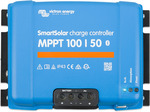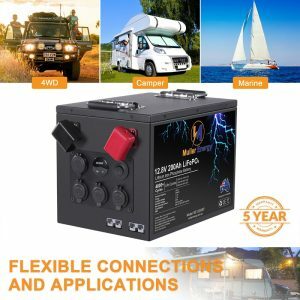I believe this is the lowest price in Australia, if it's not, please comment (given this is Ozbargain, that should go without saying 😉) and we'll see if we can beat it.
Please note that this is the SmartSolar with Bluetooth, not the BlueSolar without.
Given this is a 50A MPPT, it will give you an output of up to 700W for a 12V system and 1400W for a 24V system. And being 100V max input, allows you to connect two residential panels in series. You can of course connect multiple strings of one or two panels in parallel as well.
You can also overload the input side (as long as you stay below 100V), so you can get quite an affordable system with this MPPT using second-hand residential solar panels and still getting a very useable output.
Bluetooth Smart built-in: dongle not needed- The wireless solution to set-up, monitor and update the controller using Apple and Android smartphones, tablets or other devices.
VE.Direct- For a wired data connection to a Color Control panel, PC or other devices
Ultra-fast Maximum Power Point Tracking (MPPT)- Especially in case of a clouded sky, when light intensity is changing continuously, an ultra-fast MPPT controller will improve energy harvest by up to 30% compared to PWM charge controllers and by up to 10% compared to slower MPPT controllers.
Advanced Maximum Power Point Detection in case of partial shading conditions– If partial shading occurs, two or more maximum power points may be present on the power-voltage curve. Conventional MPPTs tend to lock to a local MPP, which may not be the optimum MPP. The innovative BlueSolar algorithm will always maximize energy harvest by locking to the optimum MPP.
Outstanding conversion efficiency– No cooling fan. Maximum efficiency exceeds 98%. The full output current up to 40°C (104°F).
Flexible charge algorithm– Fully programmable charge algorithm (see the software page on our website), and eight pre-programmed algorithms, selectable with a rotary switch (see manual for details).
Programming, real-time data and history display options- Modern Apple and Android smartphones, tablets, macbooks and other devices: see the VE.Direct Bluetooth Smart dongle and the MPPT app discovery sheet for screenshots.
Extensive electronic protection- Over-temperature protection and power derating when temperature is high. PV short circuit and PV reverse polarity protection. PV reverse current protection.
Internal temperature sensor- Compensates absorption and float charge voltage for temperature.


Victron make good stuff